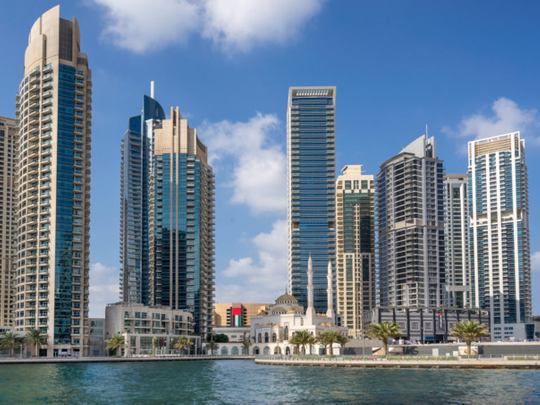
Islamic banks say a varied product portfolio and competitive pricing, in tandem with a growing number of mortgage transactions in the UAE, are attracting consumers to their home finance products. A Unitas Consultancy report based on Reidin data says that mortgage activity as a percentage of sales activity has doubled over the last seven years, accounting for 55 per cent of transactions last year.
In the UAE, Islamic banking comprises a large percentage of the total mortgage activity, and many Islamic banks offer competitive products. The penetration of Islamic banking has increased, while real estate has emerged as a desirable asset class for these banks.
Imran Ahmad, product manager at Sharjah Islamic Bank, says, “Islamic banks are on a par with their conventional counterparts in terms of products, flexibility and penetration. Since mortgages have a tangible underlying asset, they work well with Islamic financing.”
According to the 2016 Islamic Banking Index by Emirates Islamic, “In 2016, just over half of banked consumers [51 per cent] have at least one Islamic banking product, an increase of four percentage points on the previous year. Among both Muslim and non-Muslim consumers, an increased penetration of Islamic salary transfer accounts has been observed — 51 per cent of Muslim consumers and 22 per cent of non-Muslim consumers hold an Islamic salary transfer account, up from 47 per cent and 18 per cent respectively in 2015.”
Long-term asset
An asset-backed transaction, which ties in the customer for a long relationship, is preferred by banks. On the other hand, the long-term relationship motivates banks to create products that are responsive to customer needs.
Iqbal Shaikh, Head of Retail Banking, Ajman Bank, says, “Home finance, being a secured product, is definitely a focus for Islamic banks in terms of their product offerings. Being a long-term product, home finance helps in building up the profitability of the bank for a longer tenure. Most home finance cases are for a longer term, and that enables the bank to maintain a relationship with the customer over a lifetime.”
Competitive pricing
Many customers in the UAE opt for Islamic finance when it appears on the top 10 lists sorted by rates on comparison sites, indicating that, all things being equal, customers will choose according to price. “I think the home finance solution that was offered to me was very competitive in the market and provided me with a strong alternative to the other options out there,” says Vladislav Kiryushin, 30, adding that he opted for a 25-year Islamic home finance as it conforms to his religious beliefs.
On comparison websites, Islamic finance products jostle for space with conventional loans, offering rates as low as 1.79 per cent and a minimum salary of Dh7,000, with or without salary transfer. Some couple the home finance offer with insurance, called takaful.
According to the Islamic Banking Index, over half of the consumers are value seekers. “A key finding of the survey continues to be that over half of respondents [51 per cent] would seek Sharia-compliant products only if the benefits are comparable to, or better than, those offered by conventional products,” the report states.
What’s different?
Islamic banking forbids earning from riba or interest. Catering to the home finance market means getting around the concept of mortgage and interest, and replacing it with profit. Amjad Nasser, head of Sharia at Noor Bank, says there are basic differences in documentation between Islamic home finance and the conventional mortgage. “The relationship between client and Islamic bank in home finance transactions is essentially not based on a borrower-lender relationship.”
When you opt for Islamic finance when buying property, the bank does not loan money and charge interest for it. “Most Islamic home financing falls under the term Ijara, which is more of a leasing agreement between you and the bank,” Nasser explains. “There must be a tangible asset — the property itself — that you want to buy. The bank pays the price of the property to the current owner, or builder, to purchase it. The [new] owner of the property will be the bank, [which] will then lease the property out to you for a mutually agreed timeframe upon entering the contract.
“You will be charged a certain amount every month as rental, which you will pay for the agreed period. At the end of the tenure, you will have the ownership transferred to your name after full payment of all your obligations towards the financing.”
He says that most Islamic home finance products are based on Ijara, and the lease contract for Islamic home finance is known as a lease agreement ending in a transfer of ownership.
Another kind on financing called murabaha is based on sales and purchase. “This is where the bank buys a property and sells it to you at an agreed profit,” Naser says.
Similarities
For the end user, while the names and terms may be unfamiliar, the process itself is not very different from signing up for a conventional mortgage.
“The average turnaround time for receiving a pre-approval for home finance is within three to four days from the application submission date,” says Shaikh. “The documentation requirements are similar to that of a non-Sharia compliant bank, hence there is no additional paperwork or delay.”
Kiryushin says there was no noticeable difference between Islamic and conventional financing. “I did not find the process to be any more time-consuming than a normal mortgage, in fact the approval from the bank was turned around pretty quickly,” he says.
Islamic banks, like their conventional counterparts, also abide by the UAE Central Bank and the Al Etihad Credit Bureau regulations when extending financing services.
More to choose from
In today’s more mature property market, banks compete to provide the best value for money to the consumer.
“The home finance market and the evolution of the home finance products has moved to mature levels within the last few years across the industry, for both conventional and Islamic products,” says Pawan Dhawan, head of home finance at Noor Bank. “With new players entering the home finance arena, making it their key product to increase their book size and add to their revenue stream, it is evident that home finance product offerings have shown resilience during the crisis period and bounced back with a positive outlook — hand in hand with a maturing and sustainable real estate market.”
Even as developers lure buyers with attractive terms of payment and government introducing measures to protect consumers, banks are doing their part by tying with vetted partners.
“Like most banks, we prefer working with established developers, which include master developers such as Emaar, Damac, Aldar, DP World, Nakheel and Meraas, as well as various other reputable developers such as Meydan Sobha, Aldar, NBC, Aqaar, Al Seeb Properties, Al Zorah Developers, among others,” says Shaikh. “Generally, banks prefer working with developers who have an established record of projects being completed and handed over as per anticipated timelines.”
Ahmad says Sharjah Islamic Bank has partnered with developers in Sharjah such as Sharjah Holdings and Majid Al Futtaim, which is developing the Al Zahia Community, and Al Thuriah Group, which is developing Sahara Towers.
Off-plan
Off-plan financing, which is in great demand in the UAE, is also available in line with the Central Bank’s guidelines, but it may be difficult for the consumer to pay 50 per cent upfront as stipulated by law.
“We, as a financing bank, play a role when customers have completed their initial 50 per cent contribution to the developer,” says Ahmad. “In addition to this, if there are still balance payments due to be paid to a developer during the construction period, after the customer has paid 50 per cent, then we can pay the balance payment and book the finance based on the payment plan stipulated in the sales and purchase agreement signed by the customer and developer.
“Else, we generally wait until the property is ready for handover to extend our services to finance the last balance payment to the developer due at the property completion stage.”











